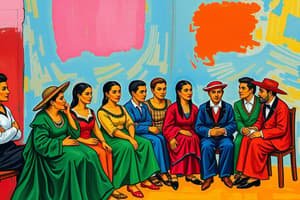Podcast
Questions and Answers
What is Charles Tilly's theory on state formation and how did war play a role in it?
What is Charles Tilly's theory on state formation and how did war play a role in it?
Charles Tilly's theory suggests that some European states transformed into 'national states' by developing coercive institutions like the army and police to protect their populations from outsiders and internal revolutions. These national states also developed economic institutions to extract revenue to pay for coercion which allowed the state to flourish, and war or the threat of war was crucial for this cycle to work.
Why does historian Miguel Angel Centeno argue that Latin America has had more military regimes?
Why does historian Miguel Angel Centeno argue that Latin America has had more military regimes?
Historian Miguel Angel Centeno argues that Latin American has had more military regimes because of the weakness of the state, which is a result of the absence of international wars in Central and South America.
What was the impact of race and class divisions in Latin America on state formation and military mobilization?
What was the impact of race and class divisions in Latin America on state formation and military mobilization?
When Latin American countries achieved independence, these divisions became a source of anxiety for the new ruling class of Creoles, and these race and class divisions also prevented the armed forces from bringing people together.
Flashcards are hidden until you start studying
Study Notes
The Role of War and State Formation in Latin America
- Charles Tilly's theory suggests that some European states transformed into "national states" by developing coercive institutions like the army and police to protect their populations from outsiders and internal revolutions.
- These national states also developed economic institutions to extract revenue to pay for coercion which allowed the state to flourish, and war or the threat of war was crucial for this cycle to work.
- Latin America has a stereotype of being ruled by military strongmen who use their armies to create strong states that oppress the people, but this is not the case for all countries in the region.
- Historian Miguel Angel Centeno argues that Latin American has had more military regimes because of the weakness of the state, which is a result of the absence of international wars in Central and South America.
- Latin American countries have frequently been ruled by military leaders, but they often lack the capacity to raise large numbers of troops and taxes to pay for them, which limits their ability to fight long, drawn-out wars.
- Latin America's huge and geographically diverse borders tend to be inhospitable for settlement, which means there is less opportunity and less reason for conflict.
- Latin American nation-states tend to see themselves as sister republics, and the continent is seen as a larger community over and above the nation-state.
- Latin American states have seen a lot of civil wars in the last two hundred years, and when Latin American states mobilize their military, it's usually against their own citizens.
- Without a lot of international wars and especially without a sense of a threatening enemy, the nation-states of Latin America just aren't as nationalist as their European counterparts.
- Latin American society was divided into a pretty rigid hierarchy with Spanish-born peninsulares at the top, indigenous people and slaves at the bottom, and Creoles and mestizos in the middle.
- When Latin American countries achieved independence, these divisions became a source of anxiety for the new ruling class of Creoles, and these race and class divisions also prevented the armed forces from bringing people together.
- Because after the 19th century, most of the European states became more concerned with providing for the welfare of their citizens than using their security forces against those citizens, and because these states have achieved undeniable economic success along with internal peace, there's a tendency in historical literature to hold them up as the greatest possible example of the nation-state.
- The tremendous growth in many Latin American countries in the past couple of decades reminds us that when it comes to history and picking winners and losers, we should remember that we are not at the end of history, but in the middle of it.
Studying That Suits You
Use AI to generate personalized quizzes and flashcards to suit your learning preferences.




